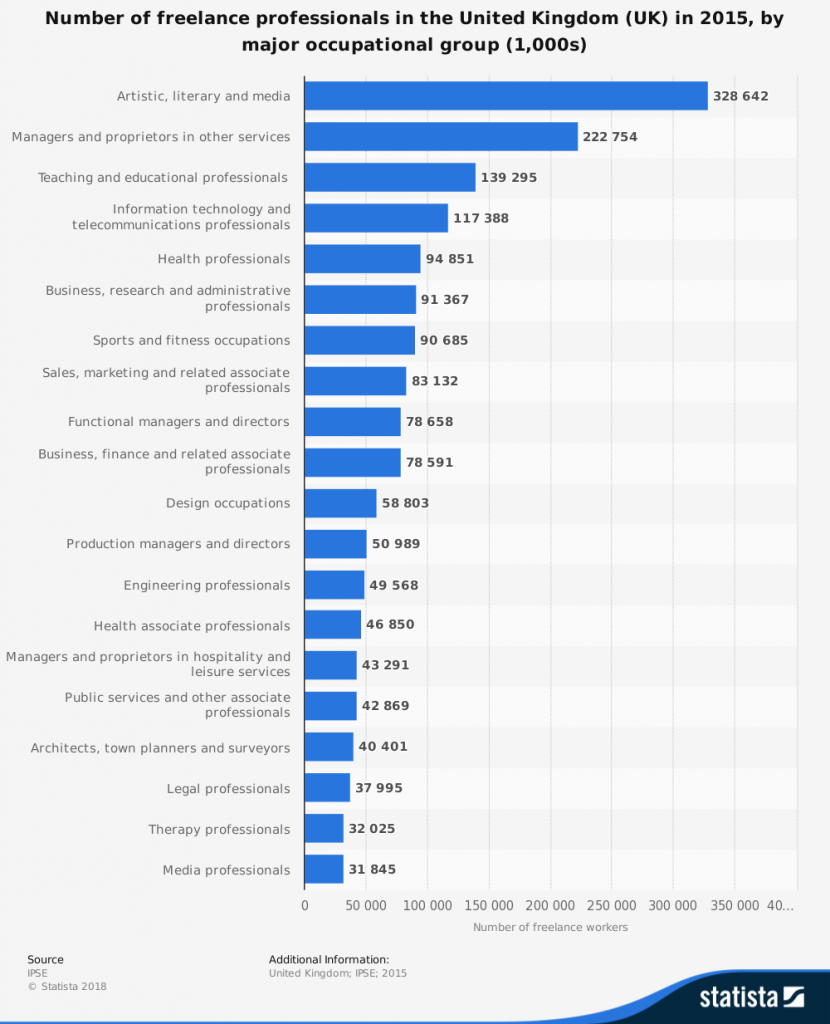1. The best brains are moving towards freelancing
Some of the best specialists and subject matter experts recognize the fact that they have an in-demand skill and are looking for opportunities to offer it to potential clients. PhDs, postdocs, researchers and experts in rapidly advancing fields like AI, data science and robotics are starting to take up contract work either full-time or part-time. Small business see a great opportunity here: they can access these experts on demand, whom they cannot afford to hire full-time, in-house.
Small business and startups typically employ graduates, not professionals with decades of experience. But they need hand-holding from an expert when they launch a specific product, scale up, or need to troubleshoot a specific problem. The transitioning of traditional employees to freelance workers allows SMEs to draw on a wider pool of resources without having to compromise on quality.
In the EU, the European Forum of Independent Professionals (EFIP) reports that independent professionals (iPros) make up 25% of all those working in professional, scientific and technical work. The number of iPros have increased from under 6.2 million in 2004 to 8.9 million in 2013, making them the fastest growing group in the EU labour market.
The graphic below shows the increase in freelancing among major work groups in the UK. Information technology and business/research professionals are in the top 6 categories.

Readiness of non-freelancers to take on additional freelance work in the United States as of 2016 | Statista
2. Hiring freelancers helps you stay lean and efficient
Small businesses are always seeking out cost-effective strategies to keep their businesses lean and profitable. Larger companies have understood that they can cut costs by giving their employees the option of telecommute and/or freelance work. The Global Workplace Analytics states that if companies allowed their employees to work from home just half the time, a typical business would save $11,000 per person per year. As more employees walk away from traditional work arrangements, startups can tap into a larger resource pool to fill their knowledge/skill gaps. Hiring remote/contract workers allows them to avoid all the traditional costs of hiring full-time employees, without having to make a compromise on the quality of talent.
Take a food startup for example. Hiring a full-time food scientist or food technologist can cost anywhere between $48000 – $72000, according to Recruiter. However, through Kolabtree, a variety of food startups hired food consultants at an average budget of $1500 and at a turnaround time of 1 week to 2 months.
3. Access a global resource pool
For small businesses, hiring can be a nightmare. They are often unable to attract high-quality talent due to geographical barriers and budget constraints. Hiring is a laborious process restricted by various factors, especially the area/state/country they operate in. Freelancing helps break geographical restrictions and policy barriers and allows small companies to hire overseas contract workers without burning a hole in their pockets. On-demand platforms make the job easier, by connecting client to freelancer and vice versa. Through Kolabtree, a US-based Amazon reseller was able to hire a data analyst from the Netherlands. Through the same platform, a US-based food startup hired a UK-based food scientist for help making gluten-free bread — they even exchanged samples till the client was happy with the outcome.
The world is getting smaller, making it easier for cross-border collaboration and innovation to thrive. If small businesses need to get ahead of the curve, they need to tap in to the expertise and knowledge of the freelance workforce available to them. Only then can they grow quickly, while remaining sustainable.
